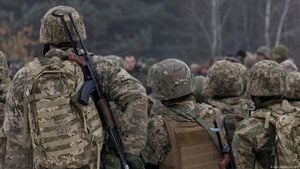The geopolitical chessboard is buzzing as the United States and its allies raise alarms about the burgeoning military collaboration between Russia and North Korea. This partnership has ignited fears across Asia and Europe, with potential ramifications for global security dynamics.
Recent statements from NATO Secretary General Mark Rutte indicated the situation has escalated sharply. He observed the direct repercussions stemming from the war in Ukraine, noting significant developments. "The war has taken a dangerous new turn, with North Korean troops now being deployed to Russia," he stated during a press conference held alongside Polish Prime Minister Donald Tusk in Warsaw.
Further details disclosed at the conference included alarming information about how Russia, with its war efforts disrupted and faltering, is turning to North Korea not only for manpower but for technological assistance as well. Reports suggest North Korea is now assisting Russia by providing artillery and possibly even military technology.
"And this is now presenting a threat, not only to us here in Europe, but also to South Korea, to Japan and to the United States mainland, and of course, China is part of the war effort by sanction circumvention, by dual use goods," Rutte warned, illustrating the broader security threat posed by this alliance.
The Pentagon's assessment indicates the presence of approximately 10,000 North Korean soldiers stationed within Russia’s borders, primarily focused around the Kursk region. The troops are believed to be training with Russian forces, engaging primarily on the eastern front where military clashes have intensified.
Adding to the complexity, U.S. officials including Under Secretary of State Bonnie Jenkins emphasized awareness of potential technology exchanges, particularly concerning nuclear capabilities. Jenkins, speaking at a recent gathering, highlighted the extent of these collaborations, which have raised valid concerns within American defense establishments.
Jenkins noted, "Moscow's ties with Pyongyang are particularly worrying, especially against the backdrop of North Korea's capacity for missile and nuclear technology development. Although we have no definitive evidence of transference, the strengthening relationship is alarming. We are engaging with our allies, particularly through cooperation with Japan and South Korea, to counteract these developments."
This military entente is not limited to Russia and North Korea alone. Rutte also mentioned Iran's role, underlining how Tehran is providing significant military support to Russia. Interestingly, this assistance occurs concurrently with the flow of financial resources back to Iran, which it reportedly uses to bolster its influence throughout the Middle East.
Rutte’s assertion emphasizes the increasingly global perspective of security matters, stating, "This situation forces us to reframe our view: the Euro-Atlantic and Indo-Pacific regions must be considered as one interconnected security theater. Our defense strategies need to adapt to this reality."
The urgency of addressing this alliance has also stirred discussions within South Korea about ramping up their support for Ukraine, prompting President Yoon Suk Yeol to declare the importance of counteracting North Korea’s adversarial actions.
At the heart of these discussions is the apparent shift taking place within military strategy across multiple nations, driven by North Korea's increasing involvement on behalf of Russia. Analysts argue this could lead to more coordinated military interventions not only from NATO forces but also from units within the South Korean military.
Active military movements between Russia and North Korea have prompted numerous debates on the future of American defense commitments to its allies within the region. Jenkins has reiterated the U.S. commitment to supporting Asian allies against any military threats arising from the North Korean-Russian partnership.
Adding to the overarching fears is the consideration of how Beijing fits within this triangle of powers. Analysts suggest China’s motivations are inherently contradictory; on one hand, it aims to maintain stability on the Korean Peninsula, yet it also benefits from the reduction of American influence within the region. This dichotomy complicates the prediction of global responses, as nations look to navigate through increasingly dangerous waters.
The ripple effects of this new partnership are already being felt, particularly with regard to technological advancements. There are fears among Western analysts concerning the potential sharing of missile technology and nuclear capabilities between two nations long viewed as rogue states.
Despite the alarming overview, both North Korea and Russia have largely remained reticent about the developments, with neither commenting directly on the North Korean troop deployment or collaborations. Instead, the Kremlin has framed its ties with Pyongyang as matters of national sovereignty, openly supporting the autonomy of their alignment.
Yet as the diplomatic standoff persists, observers are left to wonder how this coalition might evolve. Would it lead to increased military exercises? Potential arms buildups? Or, as some experts speculate, could it incite fresh negotiations as global powers scramble to recalibrate their strategic responses?
Regardless of the various predictive scenarios, what remains clear is the tension tied to this newly forged bond. Policymakers globally will be watching closely, anticipating responses from nations like Japan, South Korea, and the United States as they brace themselves for the potential fallout.
The ramifications extend not only along military lines but also within the overarching spectrum of international stability. With global alliances now dynamic and interwoven, monitoring the movements within this triad—Russia, North Korea, and potential allies like Iran—will be pivotal for maintaining any semblance of equilibrium on the world stage.
Indeed, NATO's assertion about interconnected security challenges highlights the increasingly complex nature of modern international relations where every action, particularly within contentious partnerships, has consequential effects well beyond geographical boundaries.



